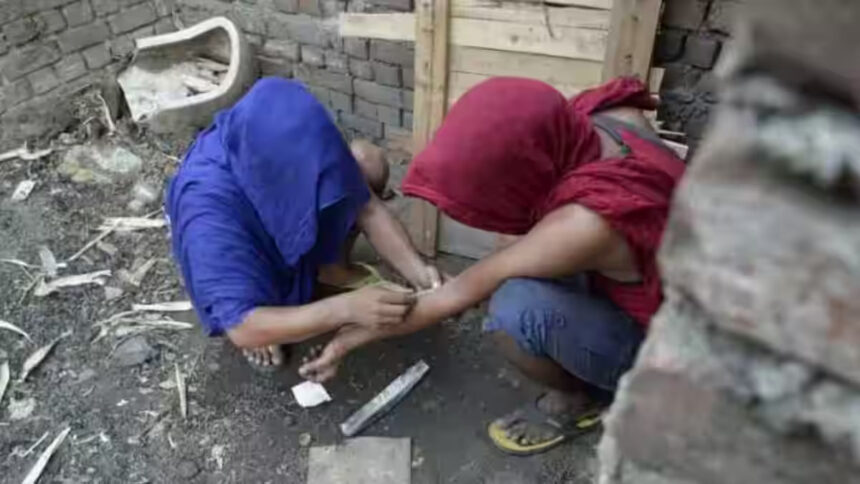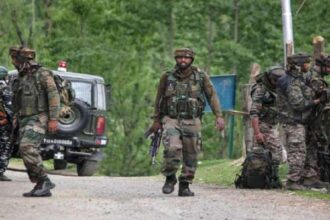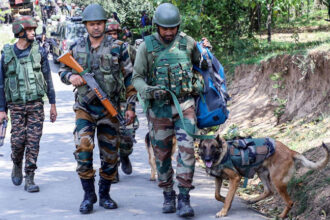The drug crisis in Jammu and Kashmir has escalated to alarming levels, with a staggering surge in drug-related crimes and heroin seizures over the past four years, casting a dark shadow on the region’s social fabric. Despite the gravity of the situation, political parties have remained remarkably silent on the issue, choosing instead to focus on contentious topics like Article 370 and statehood during the ongoing Assembly elections. The statistics paint a grim picture, with 1,681 cases registered in 2021, resulting in 2,500 arrests, and a further 3,190 cases registered in 2023-24, leading to 4,500 arrests. Moreover, heroin recovery has skyrocketed, increasing from 128 kg in 2020 to a staggering 212 kg in 2022, with a total value of approximately Rs 30,000 crore, underscoring the enormity of the crisis.
This disturbing trend has far-reaching implications, affecting not only individuals but also families and the community as a whole. The rise in drug-related crimes has led to a significant increase in addiction, with many young people falling prey to the menace. The consequences are devastating, with families torn apart, careers ruined, and lives lost. Furthermore, the economic impact of the crisis is substantial, with the estimated value of seized heroin alone exceeding Rs 30,000 crore. The silence of political parties on this critical issue is deafening, and their failure to prioritize the drug crisis has only exacerbated the problem.
Key Statistics:
- Over 9,400 arrests related to drug trafficking have been made in the last four years.
- Heroin worth Rs 30,000 crore has been seized during this period.
- In 2021, 1,681 cases were registered, leading to 2,500 arrests.
- In 2022, 1,693 cases were registered, with 2,400 arrests.
- In 2023-24, 3,190 cases were registered, with 4,500 arrests.
- Heroin recovery has increased from 128 kg in 2020 to 212 kg in 2022.
The consequences of the drug crisis are far-reaching, affecting individuals, families, and the community as a whole. The situation demands immediate attention from political parties, who must prioritize the issue and develop a comprehensive action plan to tackle it.
Challenges:
- Lack of effective enforcement and coordination among narcotics agencies.
- Inadequate treatment and rehabilitation facilities for drug addicts.
- Limited public awareness campaigns to educate people about the dangers of drug abuse.
- Insufficient support for families affected by drug addiction.
Recommendations:
- Political parties must make the drug crisis a top priority and work together with the government and civil society to tackle the issue.
- A comprehensive action plan should be developed, including prevention, enforcement, treatment, rehabilitation, and public awareness campaigns.
- The government should strengthen institutional structures and coordination among narcotics agencies.
- More resources should be allocated for treatment and rehabilitation facilities.
- Public awareness campaigns should be launched to educate people about the dangers of drug abuse.
The government has taken some steps to address the issue, including the establishment of the Narco-Coordination Centre (NCORD) mechanism, which includes regular meetings chaired by the Chief Secretary. However, more needs to be done to curb the menace effectively.
Citizens’ Role:
- Report suspicious activities related to drug trafficking to the authorities.
- Support families affected by drug addiction.
- Participate in public awareness campaigns to educate people about the dangers of drug abuse.
- Demand action from political parties and the government to tackle the drug crisis.
By working together, we can create a safer and healthier society for the people of Jammu and Kashmir.
Jammu and Kashmir Grapples with Alarming Drug Crisis as Political Parties Remain Mute
The drug menace in Jammu and Kashmir has reached unprecedented levels, with over 9,400 arrests and heroin worth Rs 30,000 crore seized in the last four years. However, the ongoing Assembly elections have seen political parties focusing on issues like Article 370 and statehood, while largely ignoring this pressing concern.
Staggering Rise in Drug-Related Crimes
Data from law enforcement agencies paints a grim picture. In 2021, 1,681 cases were registered, leading to 2,500 arrests. The following year saw 1,693 cases with 2,400 arrests. The situation worsened in 2023-24, with 3,190 cases and 4,500 arrests. Heroin recovery has also skyrocketed, from 128 kg in 2020 to 212 kg in 2022. The total heroin seized in the last four years is valued at approximately Rs 30,000 crore.
Political Apathy and Missed Opportunities
Despite the alarming statistics, political parties have failed to make the drug crisis a core agenda during the elections. The discourse continues to revolve around the restoration of special status and statehood for Jammu and Kashmir. “The drug menace and its eradication is there in our priorities. However, these elections have been held after more than a decade that too when Jammu and Kashmir was stripped of its identity and status. We have to tell people about this but at the same time, our youth are our future and eradication of drug menace is very much our top most priority,” says Khurshid Alam, a former legislator from PDP. A Congress leader acknowledged the need for immediate measures to tackle the root causes of drug addiction, which has reached pandemic proportions.
Urgent Need for Comprehensive Action Plan
The drug crisis in Jammu and Kashmir has far-reaching consequences, affecting individuals, families, and the community as a whole. It is crucial for political parties to prioritize this issue and develop a comprehensive action plan that includes prevention, enforcement, treatment, rehabilitation, and public awareness campaigns. The government has taken steps to address the problem through the Narco-Coordination Centre (NCORD) mechanism, which includes regular meetings chaired by the Chief Secretary. The forum has adopted a “zero tolerance policy” against drug trafficking and is working to strengthen institutional structures and coordination among narcotics agencies. However, more needs to be done to curb the menace effectively. Political parties must make the drug crisis a top priority and work together with the government and civil society to tackle this pressing issue head-on.
The consequences of inaction will be severe, with the potential for the drug crisis to spiral out of control and have a devastating impact on the social fabric of Jammu and Kashmir. It is imperative that all stakeholders come together to address this issue and work towards a comprehensive solution.
In conclusion, the drug crisis in Jammu and Kashmir is a pressing concern that requires immediate attention from political parties, the government, and civil society. The alarming rise in drug-related crimes and heroin seizures is a wake-up call for all stakeholders to come together and develop a comprehensive action plan to tackle the issue. The consequences of inaction will be severe, and it is imperative that we act now to prevent a catastrophe.
Additional Recommendations:
- Increase funding for treatment and rehabilitation centers to provide adequate support for drug addicts.
- Launch public awareness campaigns to educate people about the dangers of drug abuse.
- Strengthen law enforcement agencies to effectively combat drug trafficking.
- Implement effective border control measures to prevent the smuggling of drugs.
- Provide support for families affected by drug addiction.
- Encourage community involvement in addressing the drug crisis.
By working together, we can create a safer and healthier society for the people of Jammu and Kashmir.







